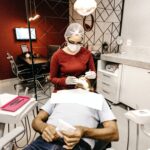
In the UK around 6500 cases of oral cancer are diagnosed each year and over the next 20 years it is expected to rise by 33%. Unlike other cancers referral to specialist care is through both primary care doctors and dentists. In the UK a slightly larger proportion a referred via the doctor although this varies in different health care systems. Outcomes vary with the stage of the disease at presentation, with around 90% of those presenting with stage 1 (early) disease surviving at 2 years compared with less than 50% with stage 4 (advanced) disease. Consequently, mouth examination and early referral are important particularly for higher risk groups.
The main aim of this review was to compare primary care doctors and dentists in the referral of oral cancer.
Methods
The Medline, Embase, Scopus, Google Scholar, Web of Science, and CINAHL databases were searched. Studies examining the referral of oral cancer from both doctors and dentists were considered. Studies needed to include information for both professions on one or more of the outcomes; proportion/percentage of diagnosed cancers referred, stage on presentation or presentation delay in relation to each profession.
Studies were selected by a single reviewer with data being extracted independently by 3 reviewers. A single reviewer assessed study quality using the methodological index for non-randomized studies (MINORS). Forest plots were generated for relative risk of dental and medical referral and a random-effects meta-analysis. A sub-group analysis was planned for all 3 outcomes for the UK if data were available.
Results
- 22 studies were included with all 22 providing data on proportion of oral cancers referred by doctors and dentists.
- 8 studies compared stage on presentation.
- 9 studies compared data on delay.
- 8 studies were from the UK, 2 each from Australia, Denmark and the USA, and 1 study from Argentina, Canada, Finland, Ireland, Israel, Japan, Thailand and the Netherlands,
- Most of the included studies were retrospective cohorts.
- Percentages of cases referred from doctors ranged from 13 – 83% and dentists 15 – 80%.
- Meta-analysis showed the risk ratio (RR) for medical compared to dental referral was 1.36 (95%CI 0.99 to 1.86) for all countries and 1.36 (95% CI 1.05 to 1.76). for the UK only.
- Meta-analysis (4 studies) indicates that dentists are more likely to refer early stage disease RR = 37 (95% CI 1.17 to 1.60).
- Meta-analyses could not be conducted for presentation delay. 2 studies reported no delay, 5 studies reported slightly greater delay for dentists and 1 for doctors. None of the studies reported a statistically significant difference.
Conclusions
The authors concluded: –
Oral cancer is referred by both GPs and dentists, typically about 50% and 40%, respectively, although there is a wide range, probably depending on local circumstances. Both groups require skills in oral examination, recognition of lesions, and knowledge of the risk factors. Effectively, regular dental attenders are a select group that is regularly screened for oral cancer, and it is likely that screening is not delivered to those with the highest risk. We suggest that further work is required on how to access high-risk individuals both for possible screening and preventive interventions.
Comments
The authors have searched a wide range of databases although study selection and quality assessment were only performed by a single reviewer. Almost all of the studies were retrospective together with some questionnaire survey and just a single prospective study. Consequently, recall bias, missing data and selection bias are potential biases noted by the authors.
This useful review highlights the role of both medical and dental primary care professional referrals for patients with oral cancer. The data indicating that overall ‘approximately 14 oral cancers were referred from GPs for every 10 from a dentist’. As discussed by the authors studies suggest that patients with potential oral cancer symptoms my prefer to visit a doctor rather than a dentist and this may be influenced by health care costs. As those from the lower socio-economic groups are less likely to be regular dental attenders and at higher risk of oral cancer this may in part explain the lower stager referrals from dentists compared with doctors. Dentists are also more likely to provide a routine examination of all the soft tissues of the mouth increasing the change of identifying earlier lesions. Population screening for oral cancer is regularly debated however at present there is insufficient evidence to recommend population-based screening (Dental Elf – 26th Nov 2013).
Links
Primary Paper
Langton S, Cousin GCS, Plüddemann A, Bankhead CR. Comparison of primary care doctors and dentists in the referral of oral cancer: a systematic review. Br J Oral Maxillofac Surg. 2020 Oct;58(8):898-917. doi: 10.1016/j.bjoms.2020.06.009. Epub 2020 Jun 24. PMID: 32591210.
Other references
Slim K, Nini E, Forestier D, Kwiatkowski F, Panis Y, Chipponi J. Methodological index for non-randomized studies (minors): development and validation of a new instrument. ANZ J Surg. 2003 Sep;73(9):712-6. doi: 10.1046/j.1445-2197.2003.02748.x. PMID: 12956787.
Dental Elf – 1st Apr 2019
Dental Elf – 26th Nov 2013
Limited evidence to decide whether visual screening reduces the death rate for oral cancer
Photo Credits
Photo by Jonathan Borba on Unsplash
